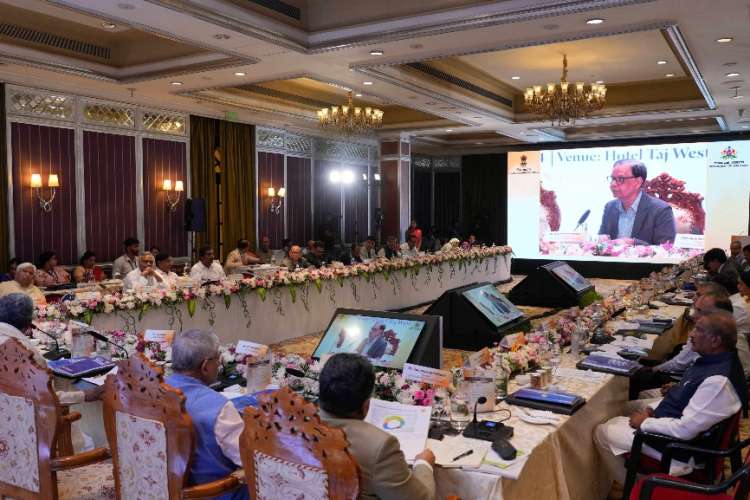
As the 16th Finance Commission begins its deliberations for the 2026–31 period, Karnataka’s submission stands out not merely as a regional appeal, but as a rigorous economic argument for reforming India’s fiscal architecture. The state’s memorandum challenges the prevailing norms of fiscal federalism and urges a recalibration that balances equity with efficiency.
Karnataka contributes an estimated Rs 4 lakh crore annually to the Union government’s gross tax revenues. Yet, its actual receipts from the Centre, including devolved taxes and grants, amount to just Rs 60,000 crore. That’s a return of Rs 0.15 for every rupee contributed—nearly half the average return received by states. This yawning gap raises a fundamental question: should a state be penalised for economic success?
READ | Fed rate freeze sparks anxiety amid tariff turmoil
Misapplied metrics: The flaws in income distance
The urgency of this question is sharpened by the decision of the 15th Finance Commission, which slashed Karnataka’s share of horizontal devolution from 4.71% to 3.64%. This resulted in a cumulative loss of Rs 79,770 crore over five years—despite Karnataka’s continued improvements in key fiscal metrics. A 23% cut in its share flies in the face of its performance on parameters like capital outlay, debt management, and social sector investment.

At the heart of this inequity lies the income distance criterion, which allocates a significant portion of devolved resources based on the gap between a state’s per capita GSDP and that of the highest-ranking state. While designed to favour poorer states, the formula assumes a strong correlation between per capita income and a state’s ability to raise revenues. This is an assumption that simply does not hold true in Karnataka’s case.
Karnataka’s economic output is powered by sectors such as IT services, biotechnology, and other zero-rated exports—activities that add to national income but yield little by way of GST or income tax for the state itself. Its own-tax revenue (OTR) stood at 7.2% of GSDP in FY 2022–23—higher than the all-state average of 6.6% but incongruent with its high per capita income. Without adjusting for the sectoral composition of a state’s economy, the income distance metric punishes innovation-led, low-tax industries—discouraging states from developing precisely the sectors that propel India’s global competitiveness.
Vertical devolution eroded by cesses, surcharges
If horizontal inequity wasn’t enough, vertical imbalances have also widened. The 14th Finance Commission had increased states’ share in the divisible pool to 42%. But the 15th Commission brought it down to 41%, citing national security spending. More worryingly, the Centre’s increasing reliance on cesses and surcharges—now forming over 19.5% of gross tax revenues—has effectively shrunk the divisible pool available to states.
Between 2017 and 2025, Karnataka alone lost Rs 53,359 crore due to this shift. The state’s proposal to cap cesses and surcharges at 5% of gross tax revenue, with the remainder merged into the divisible pool, is not confrontational. It is corrective. The trend toward fiscal verticalism, where expenditure burdens rise for states without corresponding revenues, undermines the federal compact.
Moreover, centrally sponsored schemes (CSS), often accompanied by mandatory state contributions, further constrain fiscal autonomy. Karnataka allocated nearly Rs 38,000 crore in FY 2024–25 to CSS obligations—funds that could have supported localised development priorities instead.
Broken incentive structure penalises performance
Despite maintaining a capital outlay above 2% of GSDP and a debt-to-GSDP ratio of 23.9%—well below the FRBM limit—Karnataka is being penalised in the devolution process. The state spends nearly 45% of its budget on social services like health, education, and rural development. Yet, the current devolution formula allocates 45% weight to income distance, while giving a mere 10% to fiscal effort.
If India is to reward good governance, the weight for performance metrics must rise to at least 20%. Additional instruments such as urban fiscal needs grants—for states like Karnataka with large metropolitan economies—and demographic efficiency incentives for states with lower fertility rates are long overdue.
Consider this: Bengaluru alone contributes 38% of Karnataka’s GDP. Yet, urban fiscal needs find no prominent place in the current transfer formula. The state has requested Rs 55,586 crore over five years to upgrade Bengaluru’s infrastructure and has sought a 50% matching grant from the Centre. Similarly, the underdeveloped Kalyana Karnataka region, with over 20 million residents and a human development index below 0.6, needs a Rs 25,000 crore equity grant to bridge basic infrastructure gaps. These are not demands for largesse—they are investments in the engines of India’s future growth.
Need to redesign federal incentives
Karnataka’s call is for a bold, performance-sensitive framework—one that aligns national priorities with state-level innovation and governance. The 16th Finance Commission must move beyond the binary of equity versus efficiency and embrace a multi-dimensional formula that reflects the complexity of India’s federal economy. Among the reforms proposed:
- Outcome-based grants linked to education, health, and infrastructure performance (inspired by models in the UK and Australia).
- Revenue-neutral equalisation funds, to compensate high-performing states that contribute disproportionately to national revenues.
- Special Climate Adaptation Grants, including a proposed ₹10,000 crore fund for ecologically sensitive areas like the Western Ghats.
Karnataka’s submission is neither parochial nor defiant. It is a reminder that cooperative federalism must be underwritten not by goodwill alone but by robust institutional arrangements. A fiscal contract that ignores effort, penalises innovation, and sidelines urban or ecological imperatives cannot hold in the long run.
The 16th Finance Commission has a rare opportunity—and constitutional mandate—to rewrite this contract. A framework that rewards performance, recognises asymmetries, and enables fiscal innovation will restore trust and strengthen India’s federal democracy.
Dr Debdulal Thakur is Professor, Vinayaka Mission’s School of Economics and Public Policy, Chennai. Dr Shrabani Mukherjee is Associate professor, Department of Economics, Shiv Nadar University, Chennai.
Debdulal Thakur is Professor, Vinayaka Mission’s School of Economics and Public Policy, Chennai.

